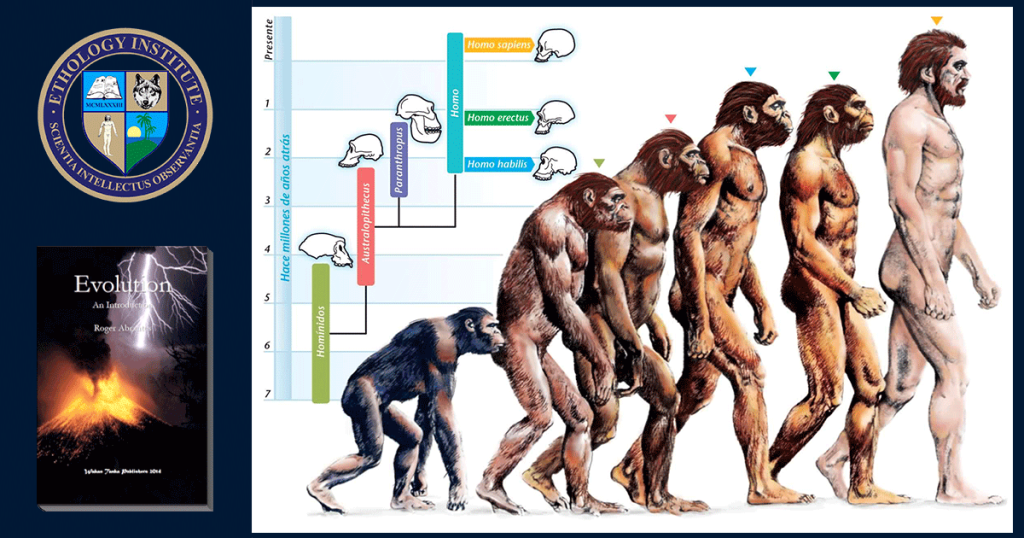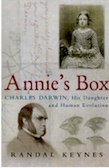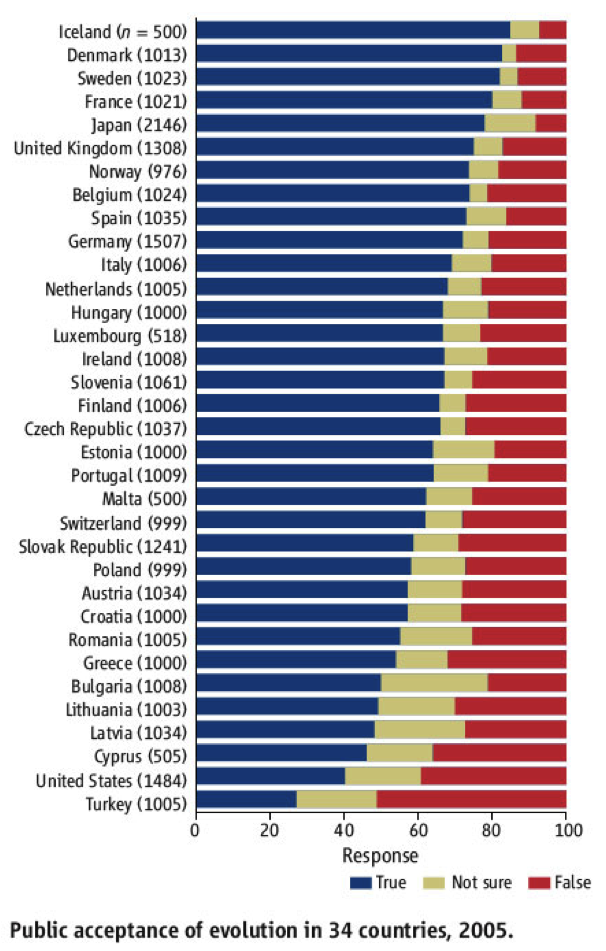(originally published September 12, 2012)
Creation opened the Toronto Film Festival 2009 and had a British premiere on September 25. The movie relies on the book “Annie’s Box—Charles Darwin, his Daughter and Evolution,” first edition from 2001, written by Randal Keynes, a great-great-grandson of Darwin.
Creation has been sold in almost every country around the world. However, US distributors passed on the film, which they expected to prove hugely controversial in a country where only 39% of Americans accept the theory of evolution (according to a Gallup poll conducted in February 2012). Finally, the movie was released in the USA on January 22, 2010.
The creationists’ attacks on Darwin and evolution are unscientific and irrational, using tricks to stir strong emotions up and numb reason (with very few exceptions). Movieguide.org, an influential site, which reviews films from a Christian perspective, described Darwin as the father of eugenics and denounced him as “[…] a racist, a bigot and a 1800s naturalist whose legacy is mass murder.” His “half-baked theory” directly influenced Adolf Hitler and led to “atrocities, crimes against humanity, cloning and genetic engineering,” the site stated. The movie has sparked fierce debate on US Christian websites, with a typical comment dismissing evolution as “[…] a silly theory with a serious lack of evidence to support it despite over a century of trying.”
Jeremy Thomas, the Oscar-winning producer of Creation, said he was astonished that such attitudes exist 150 years after On The Origin of Species was published.
For the full article on the Telegraph.co.uk, by Anita Singh, Showbusiness Editor, September 11, 2009, please click here.
Darwin’s Dangerous Idea*
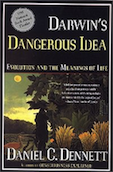 *This is the title of a book by Daniel Dennett from 1995, a book this author recommends to all who want to know the full extent of Darwin’s magnificent idea.
*This is the title of a book by Daniel Dennett from 1995, a book this author recommends to all who want to know the full extent of Darwin’s magnificent idea.
Acceptance of Darwin’s theory of evolution by natural selection, or just evolution, is remarkably low in the USA as various polls and statistics have shown. Please, see statistics below from the New York Times here, Science 11 August 2006, Vol 313, here, and the National Geographic, here.
A recent study commissioned by the British Council reveals interesting facts (see the full spreadsheet). The study asked samples of a population of 10 countries different questions about Darwin and evolution. From among the many answers, the two below are maybe particularly interesting: as to whether people had heard of Darwin and they agreed we had scientific evidence supporting evolution.
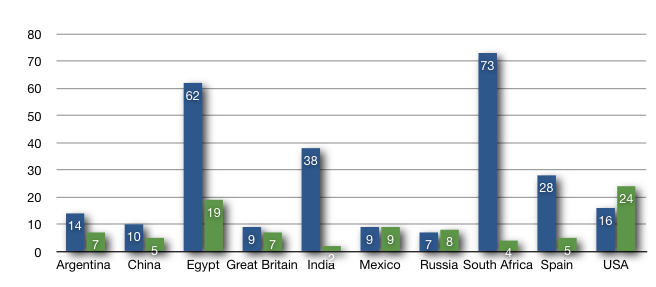 The first column indicates the answers ‘No’ to ‘Have you heard of Darwin?’ The second column indicates the answers ‘No’ to ‘Do we have scientific evidence for evolution?’ All columns show percentages of the asked population.
The first column indicates the answers ‘No’ to ‘Have you heard of Darwin?’ The second column indicates the answers ‘No’ to ‘Do we have scientific evidence for evolution?’ All columns show percentages of the asked population.
Steve Kramer analyzed the full results for statistical significances (click here).
It’s staggering that 28% of the Spanish and 16% of the USA populations had never heard of Darwin. On the other hand, it may surprise westerners that 90% of the Chinese and 93% of the Russians had heard of Darwin. 24% of the USA citizens deny the massive scientific evidence for evolution gathered throughout the last 150 years. This figure is impressive because since only 39% of all the USA population accepts evolution, this means that many take the evidence for evolution as valid and yet refuse to accept it—an apparent contradiction and proof of irrational behavior for if A => B and B => C, then A => C.
Only 5% of the Chinese and 2% of the Indians disputed the scientific evidence. As to South Africa and Egypt, the figures may reflect these countries’ enormous social and economic struggle and, therefore, insufficient school and information systems—they have more pressing issues than thinking of Darwin or evolution—which is not the case in the wealthy Western countries. However, among the South Africans who know about Darwin and evolution, only 4% dispute the scientific evidence.
It may appear surprising for westerners not proficient in Asian culture that Chinese and Indians accept evolution much better than many westerners, even though Darwin was a western born and educated scientist. His theory of evolution by means of natural selection is a western idea, maybe even the most brilliant product of western scientific thought.
The Asian Acceptance of Evolution
The Asian acceptance of evolution becomes less surprising when we realize most arguments against evolution are religious. Christianity and Islam are the religions with the highest numbers of followers, and both have a god creator and omnipotent.
Asia has Hinduism and Buddhism, and none of them precludes the notion of evolution nor conflicts with it. In Hinduism and Buddhism, there is no god creator. In this sense, regarding Hinduism and Buddhism as religions might even be misleading. Both are more philosophies of life, a list of codes of conduct, help to self-help, than real religions based on faith alone rather than arguments of reason. Therefore, Buddhists and Hindus are more liable to welcome a sound explanation of the origins of life and evolution when offered one than Christians and Islamists. Western mainstream ideology and traditions are primarily based on belief, religious oppression, and faith rather than fact. That may seem paradoxical since most of the great scientific discoveries happened in the western world.
Hinduism is a way of living according to the understanding of the principles of Vedas and Upanishads. Veda is revealed knowledge, just as the knowledge of gravity was revealed to Newton. Hinduism is the world’s oldest ‘religion’. It has no single founder; it is a mixture of various traditions, practices, and lineages.
Buddhism, the most prominent ideology in Asia, derived from Hinduism and began with Siddhartha Gautama (Buddha), who told people to assume responsibility for their lives, to search for the end of suffering by modifying their lifestyle and seeking knowledge. He led by example, as human as anyone else. He gave people choices, a manual to self-help, the four noble truths, and the eightfold path, all making perfect sense, no mysteries, no secrets, no threats, no holy wars.
Western Religion and Evolution
The Western World had an excellent opportunity to emulate Buddha when Jesus of Nazareth came around some 500 years later but didn’t. It could have given people a manual to self-help, like Buddhism’s. Instead, it made Jesus the son of God, the creator, the omnipotent, and omnipresent. The ensuing fanaticism and the church did not inspire people to seek their fortunes by actively improving their lifestyle and searching for results. It took their responsibilities away, set all the burden on the shoulders of Jesus of Nazareth, declared him the savior of humanity, God himself (according to the Bible). Then, it created many mysterious occurrences like the descent into hell and resurrection. It scared people senseless and exercised coercion—like the infamous Inquisition and the Crusades (holy wars)—declared the holiness of the church, and told the followers, “believe, repent and leave the rest to us” (or otherwise you’ll burn in hell—if we don’t burn you on Earth).
It took many years for westerners to liberate themselves from the church’s iron hand, and some did it better than others for various reasons. While Europe managed that to an extent, the USA still finds it unsettling. Still, religion alone does not explain why USAnians, more than Europeans, find it difficult to accept evolution. Many religious Europeans reconcile their faith with evolution (and so do some USAnians). Instead, the explanation lies in how USA politicians have used (and still use) religion to achieve their goals. “Believe (in us) and leave the rest to us” perfectly suits them.
Evolution in the USA
The USA is a country of strong emotions, significant economic and political manipulation, and clever demagogues. It may be fitting, not by accident, that Darwin is also often misquoted in the USA, and the “survival of the fittest” becomes “the survival of the strongest.” USA fundamentalism differs from mainstream Protestantism in both the USA and Europe. The biblical fundamentalism in the United States considers Genesis as a true and accurate account of the creation, superseding any scientific evidence.
In contrast, mainstream Protestants in Europe (and in the USA) and the Catholic Church are more contemporary in the sense that they keep pace, to a certain degree, with the evolution of the world and scientific discoveries. They consider Genesis as a metaphor and are more likely to reconcile their faith with the work of Darwin and other scientists. Furthermore, the USA has politicized evolution as never seen in Europe or anywhere else. The conservative wing of the Republican Party has adopted creationism as a part of their program to consolidate their support. In the 1990s, the Republican plans in seven states included explicit demands for teaching creation science (see 1 and 2). There are Christian political parties in Europe, but no major party uses opposition to evolution as a part of its political program.
Creation (the title is somehow unfortunate, and I’m sure Darwin would find it too pretentious) will stir up some (evolutive) discussions. We have had them in Europe (we still have them), and we grew fitter, I believe. What (most) Europeans don’t accept any longer is, “believe and leave the rest to us.” It will happen one day in the USA as well—it’s only a question of time.
In their many facets, oppression, censorship, and conformism are not evolutionarily stable strategies (ESS), not in the Christian world, not in the Islamic world, not in any world. Variation leads to ESS and has proved it again and again. Evolution is in no rush, time works for it, and its algorithm is relentless.
Learn more in our course Evolution. Evolution is the process of change in all forms of life over generations; behavior is as a tool in the struggle for survival and reproduction. This is an indispensable course to understand how behavior originates, develops and evolves. Evolutionary biologist Roger Abrantes wrote the textbook included in the online course as a beautiful flip page book. This is a free course. Start today.
